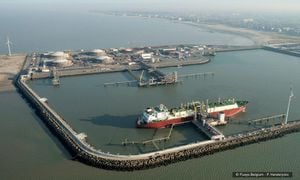Donald Trump’s second term has initiated sweeping changes, steering the United States away from long-established global norms. Just weeks after taking office, Trump is reshaping relationships and policies, much to the dismay of European leaders and domestic political opponents. His early focus has been on dismantling the systems painstakingly built over the last eight decades of international cooperation.
European diplomats, caught off guard by the speed of these changes, convened urgently. Trump has taken controversial stances on pivotal issues, such as the war in Ukraine, aligning more closely with Russian President Vladimir Putin than his own NATO allies. This pivot has rattled European confidence and has raised questions about the reliability of the U.S. as a partner.
Adding to the tension, Trump has imposed executive orders impacting transgender rights, igniting intense protests and litigation threats. During a heated exchange with Maine's Democratic governor over his directive banning transgender athletes from competing on women’s sports teams, the governor curtly replied, “See you in court.” Trump's rationale rests on assertions of preserving women’s sports, but advocates for transgender rights decry the order as discriminatory.
Trump also made waves at the recent Conservative Political Action Conference (CPAC), where he delivered his trademark rhetoric, focusing on themes of immigration, election integrity, and supposed corruption within Washington. Notably, he boasted about initiating what he termed the largest deportation operation the U.S. has ever seen, telling supporters, “We’ve begun the largest deportation operation in American history.”
His speech at CPAC showed the depth of loyalty he commands from the political right, as he reaffirmed his commitment to strong-arm policies at the border, which he calls necessary to repel what he characterizes as invasion forces.
Meanwhile, on the international front, Trump's Vice President, JD Vance, criticized European leaders, labeling them “tyrants” for their political stances, and directly challenged long-held alliances. This drastic rhetoric has not only heaped pressure on NATO’s mutual defense agreement but also emboldened far-right parties within Europe, creating doubt over the unity of European governments.
“We need to take ownership of conventional security on the continent,” Defense Secretary Pete Hegseth announced, undermining the foundational principles of NATO and exacerbated wariness among allies. The anxiety surrounding Trump's foreign policy has prompted nations like France to reconsider military expenditures due to uncertainties involving U.S. commitment.
French President Emmanuel Macron has been vocal about these apprehensions, asserting, “Deep down you can’t be weak in the face of Putin, it’s not you, it’s not your trademark.” Macron's forthcoming visit to the White House is set to address these very issues, seeking to negotiate America back toward cooperative engagement.
Despite these disquieting signs, Trump has endeavored to reposition power dynamics to favor nationalistic ideologies, mooring closer relationships with right-wing factions within Europe itself. His strategy aligns with his significant support base back home, where themes of patriotism and “America First” resonate deeply.
Trump's claims of unprecedented successes over the initial four weeks of his administration are seen as both erratic and hyperbolic by critics. Nonetheless, he maintains, “Nobody has seen four weeks like we’ve had.” He combines this rhetoric with various aggressive policy initiatives, including vast cuts to regulations, modifying international treatment on tariffs, and rolling back climate commitments.
With Trump reversing U.S. policies, traditional alliances face unprecedented challenges. International leaders, especially European Prime Minister Keir Starmer, navigate this hostile environment as they aim for cooperation, yet remain trepidatious about the direction taken by the new U.S. administration.
Starmer’s attempts to pivot Britain back to its historical role as the intermediary between the United States and Europe come under scrutiny with Trump’s unpredictable leadership. All eyes remain on upcoming discussions between Western leaders and Trump, as the world watches whether diplomacy or conflict will prevail.
Trump's approach to governance is clear—the establishment of new norms, constitutional battles, and international relationships reshaped under his command signals not just changes to the course of the U.S. but potentially the political landscapes beyond its shores.



